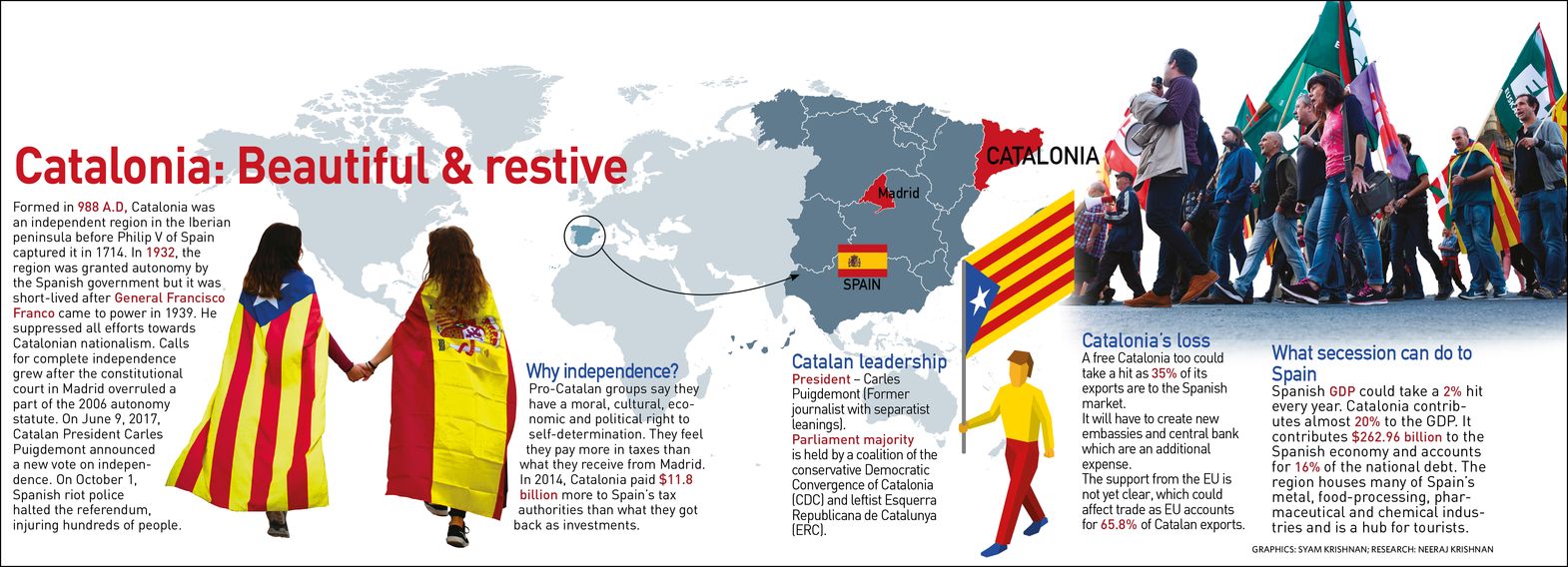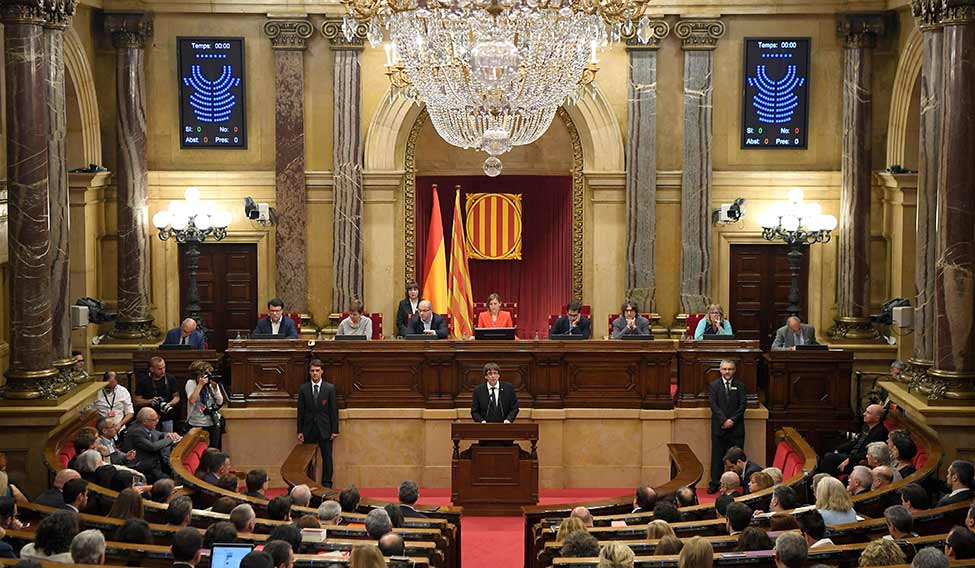The sleep of reason produces monsters” is a famous etching by Spain’s most celebrated artist Francisco Goya. When sense slumbers, demons of folly and ignorance prowl. It is Goya’s satirical depiction of Spanish society—two centuries ago! That warning tolls ominously today as secessionism in Spain’s northeast corner of Catalonia endangers a prosperous region, nation and indeed the European continent. “Spain has sleepwalked into a nightmare,” said veteran international peace negotiator Francesc Vendrell, a Catalan.
Fatal collision unfolds between the separatist regional Catalan government based in innovative, beautiful Barcelona and the conservative central government in imperial, magnificent Madrid, which will not brook separatism. Foreigners flock to Catalonia to ski and hike in the picturesque Pyrenees mountains that border France, sunbathe in the balmy Mediterranean beaches or enjoy the tapas, wine and architectural wonders of fun and funky Barcelona, where Catalan architect Antoni Gaudí’s fantastical Gothic-Byzantine cathedral is one of Spain’s top tourist magnets.
The architect of Catalan secession is Carles Puigdemont, president of this autonomous region, which has its own language, culture, tradition and a 1,000-year history. “With the results of the referendum, I defend the mandate for Catalonia to become an independent republic. We are suspending the declaration of independence for a few weeks, because we want a reasonable dialogue, a mediation with the Spanish state,” he declared on October 10 from the chandeliered regional parliament. The mild-mannered, professorial, journalist-turned-president and son of a village baker, is no Che Guevara, but Puigdemont is a nationalist, the first Catalan president to not take the mandatory loyalty oath to the Spanish constitution and the current King Felipe VI.
Despite the traumatic August jihadi terrorist attack, Barcelona was euphoric a month ago when a million Catalans thronged the streets with huge banners of their own—not the Spanish flag—to celebrate Diada, Catalonia’s national day. There was excitement as the local government defied Madrid to conduct an independence referendum. There was raucous solidarity as citizens, including immigrants, banged pots and pans on their balconies every night for 15 minutes to tom-tom their protest to Madrid. There was a whiff of insurrection in certain Catalan pockets, from Pyrenees villages to University of Barcelona campus, when youngsters voted for independence. But joy turned to shock when Madrid sent national police to heavy handedly thwart voting.
Now the fraught and fractured Catalan society is on full display as neutral, pro- and anti-independence protesters choke streets, reviving troubling memories of the devastating 1930s Spanish Civil War. “We are in a sticky nest of nettles. It is prickly and messy,” said University of Barcelona professor John Stone.
Prickly days lie ahead as Spanish and Catalan authorities brace for a bruising showdown. Spain’s Prime Minister Mariano Rajoy told El País newspaper, “We will prevent independence from occurring. It will not happen.” Consequences of this confrontation will ricochet across the restive regions of Spain, in Galicia and in the Basque region, the homeland of violent secessionism in the 1980s.
Madrid vowed to abort Catalonia’s “illegal and unconstitutional” secession referendum. But it took place, despite Madrid shutting down referendum websites and sending its police to arrest Catalan officials and seize millions of ballot papers. Over 2.2 million Catalans voted, but the drama shocked Europe. Images went viral—of masked federal police raiding schools, capturing ballot boxes, firing rubber bullets, beating up old men, dragging women by the hair out of polling stations and scuffling with local Catalan police. Emotions churned. Catalan-born football idol Gerard Piqué wept openly on Spanish television.
The crackdown gave the flawed referendum a legitimacy it lacked. Outlawed by Spain’s unitary constitution, boycotted by local opposition parties and with no option to vote against secession, the turnout was 43 per cent. Opinion polls show that most Catalans don’t want independence, though they want autonomy and passionately defend their right to vote. Political scientist Federiga Bindi said, “Spanish Prime Minister Rajoy has transformed what would have otherwise been a unilateral, unconstitutional and useless referendum into a major victory for the separatists.”
A decade ago, there was no trace of rebellion. Catalonia’s 7.5 million population is comparable to Switzerland’s. It is the world’s 34th biggest economy, bigger than Portugal and Hong Kong, accounting for one-fifth of Spain’s GDP and a quarter of its exports. It is the nation’s economic powerhouse, its industrial heartland, with car, chemical and textile factories, a historical trading centre and a modern hub of IT, finance, services and innovation. Its per capita GDP is €30,000, wealthier than South Korea, Israel or Italy.
But Catalans feel aggrieved. The 2008 financial crisis hit Catalonia hard with bankruptcies, downsizing and youth unemployment at 35 per cent. “So many people were impoverished, income inequality widened sharply,” said Catalan audiovisual translator Rosa Roig. Across Spain, the insane real estate bubble burst, ruining construction companies, banks, municipalities, small businesses and families. But the anti-elite, anti-establishment left-wing protest movement that swept Spain coalesced into a nationalist movement in Catalonia. “The militant, anti-Catalan policies of Rajoy and his People Party fuelled support for Catalan independence,” said political theorist Onno Seroo.
Frustrated Catalonia resents receiving less revenue than what it gives Madrid— twice what Scotland gives to Britain—subsidising poorer regions of Spain. It resents declining federal investment in infrastructure, its inability to invest all its revenue locally as do the Basques, and Madrid’s curtailment in 2010 of its autonomy, especially financial, and its 'nation' status. Catalans believe Rajoy’s party is demonising them to galvanise his right-wing votebank. The seeds of separatism were sown. Fertilised by political grievance and economic hardship, they are being harvested now.
Secession is sedition and if provoked, Madrid will invoke article 155 of the constitution and impose federal rule in the region, arrest local police and impose 15-year jail terms for “traitors”. Puigdemont complained Madrid disdained the Catalan crisis as a legal, not political, issue. Spain’s Deputy Prime Minister Soraya Sáenz de Santamaria retorted, “Outside the law there is no democracy.”
Meanwhile, ordinary people try to get on with their lives. Old men gather in Barcelona’s parks to play their usual round of ball game Boccia, old ladies sit on street benches under leafy trees munching their lunch, children skip to day-care centres, trailed by their parents or grandparents, while dark-suited businessmen walk fast and talk faster on their mobiles—about negocio (business) and revolución.
Vicious verbal wars in mainstream and social media inflame passions. Literary activist Basilio Baltasar said, “We need psychoanalysts and not politicians to understand why this secession battle has become so emotional. Politicians are using the same rhetoric that led to the Spanish Civil War, igniting passions that are difficult to extinguish.”
The 1930s brutal civil war cleaved Spanish society between the left-leaning, democratic Republicans and the aristocratic conservatives and monarchists, culminating with the rise of fascist military dictator Francisco Franco in 1939. Both George Orwell and Ernest Hemingway reported from the frontlines of the Spanish Civil War, eventually writing their literary masterpieces—Homage to Catalonia and For whom the Bell Tolls. Orwell writes in Homage, “One of the most horrible features of war is that all the war-propaganda, all the screaming and lies and hatred, comes invariably from people who are not fighting.” Today’s cyber warriors prove his point.
Franco revoked Catalonia’s autonomy, crushed their nationalism, language and civil institutions. Elderly Catalans recall how Franco’s supporters slapped them on the streets if they spoke Catalan instead of Spanish. The oppression ended only with Franco’s death in 1975. A young democracy, Spain decentralised in 1978 by restoring regional autonomy. Its 1986 integration into the European Union strengthened stability and prosperity, until the 2008 crisis.
Today’s secession crisis imperils Spain’s current economic recovery, especially in Catalonia. Banks and businesses are readying to exit Barcelona. Tourists flee when faced with demonstrations. Secession is a risky, costly war. “Everybody needs to step back from the brink, start serious dialogue and find a mutually acceptable agreement,” said Vendrell.
In the emotionally charged atmosphere, negotiation is a sign of weakness, compromise means losing face. Rajoy rules out mediation, but the EU that urges dialogue can discreetly nudge both sides to talk. “Catalonia’s economy is intertwined with Spain’s and EU’s, it is a strategic area for fighting terrorism. The EU must come up with an inclusive, values-based institutional approach to accommodate self-determination,” said Seroo. Unless contained quickly and effectively, Catalonia can have a domino effect on Europe, spreading the flames of separatism from Corsica in France to Flanders in Belgium.
Constitutional and financial reforms can douse the fires of secessionism. “This is an opportunity to transform Spain’s quasi-federal structure with its unequal and constantly moving goalposts of division of power into a more stable devolution that balances sovereignty with self-rule,” said Stone. Experts say the German Länder system is a good model, giving federal states control over culture and law enforcement with arrangements for revenue sharing.
Disaster lurks in Don Quixote fantasies of Catalan independence and Spanish domination. “Catalonia’s secession from Spain can be averted if common sense prevails,” said Charles Powell, director of Elcano, Spain’s leading think-tank in Madrid. Symbolising the voice of reason, Barcelona’s mayor Ada Colau urged, “More than ever we need dialogue and bridges.” Rather than tilting at windmills, Spanish and Catalan authorities can deflect tragedy by reclaiming the sensible middle ground.
The full epigraph of Goya’s etching reads, “Fantasy abandoned by reason produces impossible monsters; united with reason, fantasy is the mother of the arts and the origin of their marvels.” Wise advice to his beautiful country, rich in marvels, encompassing literature and nature, cuisine and culture, arts and architecture, flamenco and football.









